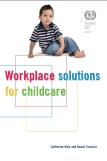Work and family



Pressures from an increasingly competitive work environment combined with lack of support for family responsibilities are leading to considerable conflicts and stresses for workers trying to “juggle” work with family responsibilities. It is sometimes assumed that in developing countries family responsibilities are not really a problem since workers can appeal to traditional family solidarity and find some relative who can help look after dependents. However, evidence suggests that family support for the domestic and caring responsibilities of those who work outside the home is less and less available and increasingly problematic, particularly in the urban areas.
Work-family measures are policy solutions intended to facilitate all workers' access to decent work by explicitly and systematically addressing and supporting their unpaid family responsibilities. ILO Convention on Workers with Family Responsibilities, 1981 (No. 156) and its accompanying Recommendation No. 165 provide considerable policy guidance and represent a flexible tool to support the formulation of policies that enable men and women workers with family responsibilities to exercise their right to engage, participate and advance in employment without discrimination.
What we do
The Conditions of Work and Employment Programme is working in partnership with the ILO tripartite partners and other concerned groups and organizations to promote policies and measures which are in line with relevant international labour standards.
